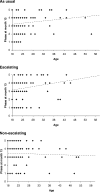An effectiveness trial of contingency management in a felony preadjudication drug court
- PMID: 19192860
- PMCID: PMC2606594
- DOI: 10.1901/jaba.2008.41-565
An effectiveness trial of contingency management in a felony preadjudication drug court
Abstract
This study evaluated a contingency management (CM) program in a drug court. Gift certificates for compliance were delivered at 4- to 6-week intervals (total value = $390.00). Participants in one condition earned gift certificates that escalated by $5.00 increments. Participants in a second condition began earning higher magnitude gift certificates, and the density of reinforcement was gradually decreased. No main effects of CM were detected, which appears to be attributable to a ceiling effect from the intensive contingencies already delivered in the drug court and the low density of reinforcement. Preplanned interaction analyses suggested that participants with more serious criminal backgrounds might have performed better in the CM conditions. This suggests that CM programs may be best suited for more incorrigible drug offenders.
Figures


References
-
- American Psychiatric Association. Diagnostic and statistical manual of mental disorders (4th ed.) Washington, DC: Author; 1994.
-
- American Society of Addiction Medicine. Patient placement criteria for the treatment of substance-related disorders (2nd ed. rev.) Chevy Chase, MD: Author; 2000.
-
- Andrews D.A, Bonta J. The psychology of criminal conduct (2nd ed.) Cincinnati, OH: Anderson; 1998.
-
- Burdon W.M, Roll J.M, Prendergast M.L, Rawson R.A. Drug courts and contingency management. Journal of Drug Issues. 2001;31:73–90.
-
- Festinger D.S, DeMatteo D.S, Marlowe D.B, Lee P.A. Expungement of arrest records in drug court: Do clients know what they're missing. Drug Court Review. 2005;5:1–21.

